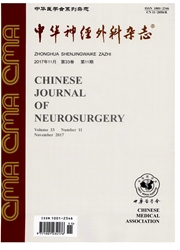

 中文摘要:
中文摘要:
目的比较颅内破裂动脉瘤急性期和非急性期手术治疗的特点。方法对2008年12月至2010年12月浙江大学医学院附属第二医院神经外科收治的449例颅内破裂动脉瘤手术病例进行分析。比较急性期手术组与非急性期手术组在术前破裂风险、完全夹闭率、术后并发症发生率以及预后的差异。结果两组相比,非急性期手术组术前再破裂风险明显升高,差异有统计学意义;术中完全夹闭率、术后并发症发生率及预后差异无统计学意义。亚组分析中,Hunt—HessI-Ⅲ级亚组间术前再破裂风险差异有统计学意义,其他同级别亚组间完全夹闭率、并发症发生率、及预后差异无统计学意义。结论急性期手术可以明显减少术前再次出血,尤其是Hunt—Hess评分I~Ⅲ级的患者可通过急性期手术减低因术前出血引起的死亡致残风险。
 英文摘要:
英文摘要:
Objective To study the advantages and disadvantages of aneurysm surgery with different timing in a two - year period. Methods This study examined 449 patients with ruptured intracranial aneurysms treated surgically between Dec 2008 and Dec 2010 in Department of Neurosurgery, 2nd affiliated hospital of Zhejiang University Medical Institute. Early aneurysm surgery was defined as operation performed within 72 hours after onset of subarachnoid haemorrhage; non - early surgery as performed after 72 hours. Multiple factors, including the incidence of pre - operative rebleeding, incidence of complete occlusion of the ruptured aneurysm and incidence of major complications such as cerebral infarction and hydrocephalus, were analyzed. Surgical outcomes after 3 months were assessed using the Glasgow outcome score (GOS). Survival analysis was used to analyze 3 months follow - up date with outcome events as death, cerebral infarction or hydrocephalus. Patients were categorize into 2 subgroups grading by the Hunt - Hess classification, that was, one subgroup of patients with Hunt - Hess grades Ⅰ , Ⅱ and Ⅲ and the other subgroup of patients with grades Ⅳ and Ⅴ. Multiple factors of the two subgroups were analyzed. Results 50. 1% of cases fell into the early surgery group and 49. 9% into the non - early operated group. There was a lower rate of pre - operative rebleeding in the early surgery group (5.36% versus 1.33% , P 〈 0. 05). The incidence of complete occlusion of the ruptured aneurysm and the incidence of major complications showed no significant difference between these 2 groups. There was no significant difference in GOS between the early surgery group and the non - early surgery group at 3 months. In the subgroup of patients with Hunt - Hess grades Ⅰ , Ⅱ and Ⅲ, there was a lower rate of pre - operative rebleeding in the early surgery group (3.98 versus 0. 49%, P 〈 0. 05 ) and there was no significant difference in other factors. In the subgroup of patients with Hunt - Hess grades Ⅳ and
 同期刊论文项目
同期刊论文项目
 同项目期刊论文
同项目期刊论文
 期刊信息
期刊信息
